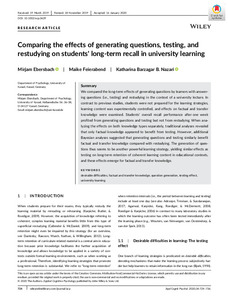| dc.date.accessioned | 2020-05-20T07:54:40Z | |
| dc.date.available | 2020-05-20T07:54:40Z | |
| dc.date.issued | 2020-01-21 | |
| dc.identifier | doi:10.17170/kobra-202005071231 | |
| dc.identifier.uri | http://hdl.handle.net/123456789/11565 | |
| dc.description.sponsorship | Gefördert im Rahmen des Projekts DEAL | |
| dc.language.iso | eng | |
| dc.rights | Attribution-NonCommercial-NoDerivatives 4.0 International | * |
| dc.rights.uri | http://creativecommons.org/licenses/by-nc-nd/4.0/ | * |
| dc.subject | desirable difficulties | eng |
| dc.subject | factual and transfer knowledge | eng |
| dc.subject | question generation | eng |
| dc.subject | testing effect | eng |
| dc.subject | university learning | eng |
| dc.subject.ddc | 150 | |
| dc.title | Comparing the effects of generating questions, testing, and restudying on students' long‐term recall in university learning | eng |
| dc.type | Aufsatz | |
| dcterms.abstract | We compared the long‐term effects of generating questions by learners with answering questions (i.e., testing) and restudying in the context of a university lecture. In contrast to previous studies, students were not prepared for the learning strategies, learning content was experimentally controlled, and effects on factual and transfer knowledge were examined. Students' overall recall performance after one week profited from generating questions and testing but not from restudying. When analyzing the effects on both knowledge types separately, traditional analyses revealed that only factual knowledge appeared to benefit from testing. However, additional Bayesian analyses suggested that generating questions and testing similarly benefit factual and transfer knowledge compared with restudying. The generation of questions thus seems to be another powerful learning strategy, yielding similar effects as testing on long‐term retention of coherent learning content in educational contexts, and these effects emerge for factual and transfer knowledge. | eng |
| dcterms.accessRights | open access | |
| dcterms.creator | Ebersbach, Mirjam | |
| dcterms.creator | Feierabend, Maike | |
| dcterms.creator | Barzagar Nazari, Katharina B. | |
| dc.relation.doi | doi:10.1002/acp.3639 | |
| dc.subject.swd | Universität | ger |
| dc.subject.swd | Lernen | ger |
| dc.subject.swd | Wissenschaftstransfer | ger |
| dc.subject.swd | Frage | ger |
| dc.type.version | publishedVersion | |
| dcterms.source.identifier | eissn:1099-0720 | |
| dcterms.source.issue | Issue 3 | |
| dcterms.source.journal | Applied cognitive psychology | eng |
| dcterms.source.pageinfo | 724-736 | |
| dcterms.source.volume | Volume 34 | |
| kup.iskup | false | |


